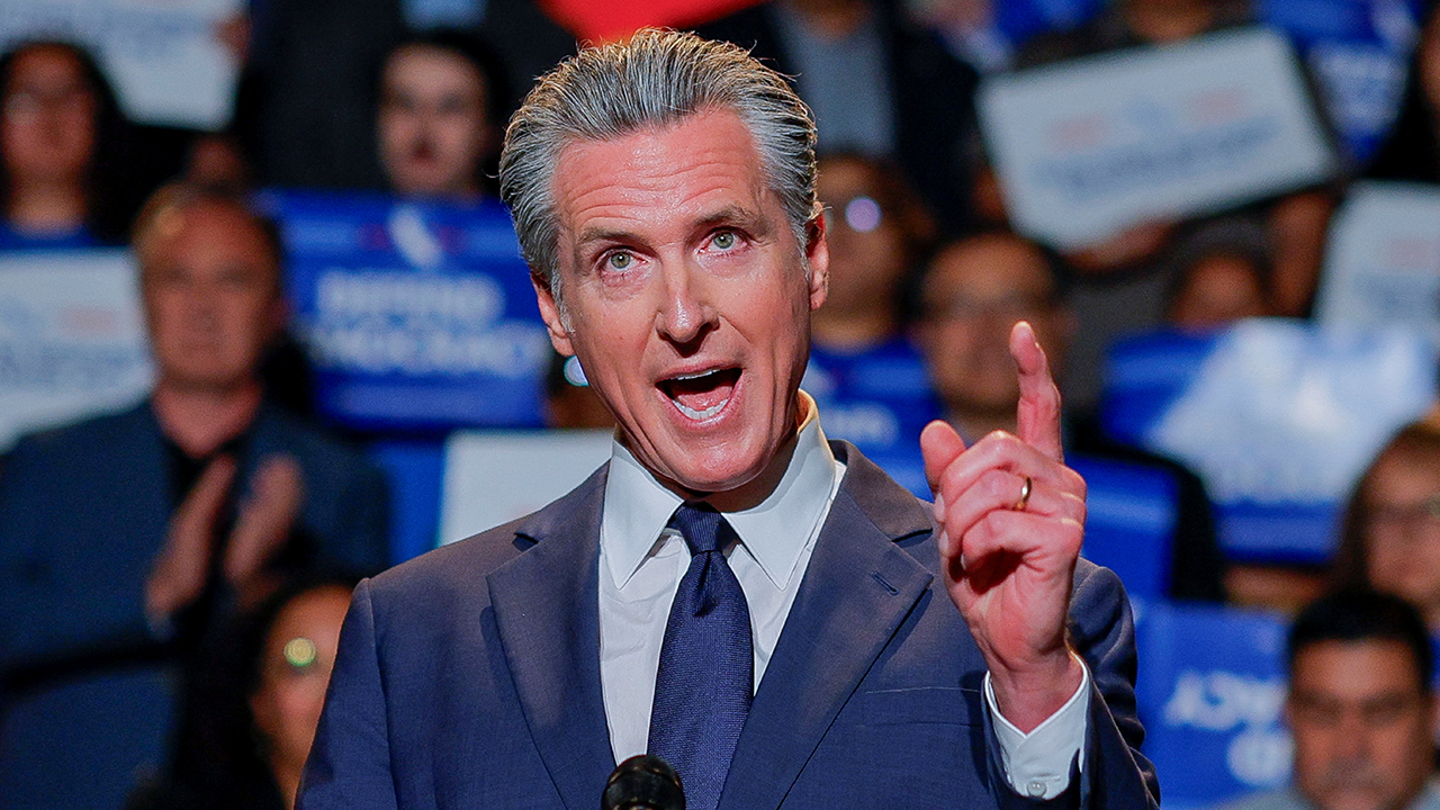
California's largest high school district adopts policy to oppose trans athletes in girls' sports
Entities mentioned:
- Kern High School District: Righteousness, Obligation, Professional pride
- U.S. Department of Justice: Justice, Control, Influence
- Sonja Shaw: Moral outrage, Determination, Righteousness
- California Interscholastic Federation (CIF): Loyalty, Pride, Obligation
- Gov. Gavin Newsom: Self-preservation, Wariness, Influence
Article Assessment:
Credibility Score: 75/100
Bias Rating: 65/100 (Lean Right)
Sentiment Score: 35/100
Authoritarianism Risk: 45/100 (Mixed/Neutral)
Bias Analysis:
The article leans right, focusing more on opposition to trans athletes in girls' sports. It gives more space to voices supporting the resolution and presents challenges to trans inclusion.
Key metric: Gender Equality in Sports
Let me tell you something - this story is a GAME-CHANGER in the world of high school athletics! We're seeing a MAJOR POWER PLAY by Kern High School District, stepping up to the plate and swinging for the fences with this Title IX resolution. It's like they're calling an audible at the line of scrimmage, folks! The U.S. Department of Justice is blitzing from all angles, bringing the heat with lawsuits that could change the whole playing field. But don't count out the California Interscholastic Federation - they're digging in their cleats and refusing to back down. This is a fourth-quarter showdown with the clock ticking, and the stakes couldn't be higher! Governor Newsom is playing prevent defense, trying to avoid getting tackled on this hot-button issue. It's a political chess match with the future of girls' sports hanging in the balance. I'm telling you right now, this is the kind of high-stakes drama that defines champions. We're witnessing a clash of titans, with each side bringing their A-game and leaving it all on the field. Buckle up, sports fans - this battle is far from over!

California volleyball team with trans player stays undefeated in league play, in first place after forfeits
Entities mentioned:
- Jurupa Valley High School Girls Volleyball Team: Competitive spirit, Pride, Unity
- AB Hernandez: Determination, Self-respect, Competitive spirit
- Opposing Teams: Moral outrage, Loyalty, Self-preservation
- Jurupa Unified School District: Obligation, Unity, Justice
- Gov. Gavin Newsom: Self-preservation, Duty, Wariness
- California Legislature: Control, Justice, Righteousness
Article Assessment:
Credibility Score: 75/100
Bias Rating: 55/100 (Center)
Sentiment Score: 35/100
Authoritarianism Risk: 40/100 (Generally Democratic)
Bias Analysis:
The article presents multiple viewpoints, including those supporting and opposing trans athletes. However, it gives slightly more space to opposition arguments and emotive language.
Key metric: Gender Equality in Sports Participation
Let me tell you something - this story is a GAME-CHANGER in the world of high school sports! We're seeing a HEAVYWEIGHT BATTLE between inclusion and tradition playing out on the volleyball court. Jurupa Valley High School's team is DOMINATING the league, but they're facing more forfeits than spikes! It's like they're winning by technical knockout before the first serve! This transgender athlete has become the MVP of controversy, with opposing teams RUNNING SCARED instead of facing them on the court. It's a FULL COURT PRESS of legal challenges and political maneuvers, with the Governor trying to avoid getting caught in the crossfire like a rookie caught between two power hitters. The California Legislature is playing DEFENSE, blocking bills faster than a middle blocker at the net. This is the kind of high-stakes matchup that will be talked about for seasons to come, folks!

California high school volleyball team with trans athlete sees more forfeits after teammates file lawsuit
Entities mentioned:
- Jurupa Valley High School: Competitive spirit, Unity, Determination
- Transgender Athlete: Recognition, Self-respect, Competitive spirit
- Opposing Teams (Aquinas, Yucaipa, San Dima): Moral outrage, Righteousness, Competitive spirit
- Plaintiffs (Madison, Alyssa McPherson, Hadeel Hazameh): Righteousness, Self-preservation, Justice
- Jurupa Unified School District: Obligation, Duty, Wariness
- California Interscholastic Federation: Control, Obligation, Professional pride
- California Department of Education: Control, Obligation, Wariness
- Gov. Gavin Newsom: Self-preservation, Power, Influence
Article Assessment:
Credibility Score: 75/100
Bias Rating: 55/100 (Center)
Sentiment Score: 30/100
Authoritarianism Risk: 35/100 (Generally Democratic)
Bias Analysis:
The article presents multiple viewpoints, including those of the plaintiffs, schools, and government agencies. While it gives more space to the concerns of the plaintiffs, it also includes statements from opposing sides.
Key metric: High School Sports Participation Rates
Let me tell you something - this story is RIDICULOUS! We're seeing a full-court press of controversy in California high school volleyball! The game plan here is more complex than a championship playbook, folks. Jurupa Valley High School is trying to field a competitive team, but they're facing more forfeits than a team with a bunch of ineligible players! It's like they're stuck in the penalty box before the match even starts! The opposing teams are making power plays, forfeiting games faster than a struggling franchise dumps salary. Meanwhile, the plaintiffs are calling for instant replay on the whole season, challenging the rules of the game itself! This is a high-stakes match where everyone's fighting for their own endzone. The school district and state agencies are playing defense, trying to avoid any penalties, while Governor Newsom is pulling a classic misdirection play, passing the ball to other players on the field. I'm telling you right now, this is going to be a long, drawn-out contest with no clear winner in sight. It's fourth and long for everyone involved, and we're headed for overtime!

California high school volleyball team with trans athlete sees more forfeits following lawsuit by teammates
Entities mentioned:
- Jurupa Valley High School: Competitive spirit, Unity, Determination
- Transgender Athlete: Competitive spirit, Self-respect, Recognition
- Lawsuit Plaintiffs: Righteousness, Justice, Moral outrage
- Jurupa Unified School District: Obligation, Duty, Wariness
- California Interscholastic Federation: Control, Duty, Professional pride
- California Department of Education: Duty, Control, Wariness
- Gov. Gavin Newsom: Self-preservation, Wariness, Control
Article Assessment:
Credibility Score: 75/100
Bias Rating: 55/100 (Center)
Sentiment Score: 30/100
Authoritarianism Risk: 35/100 (Generally Democratic)
Bias Analysis:
The article presents multiple viewpoints, including those of the plaintiffs, schools, and state officials. While it gives more space to the concerns of the plaintiffs, it also includes statements from the opposing side.
Key metric: High School Sports Participation Rate
Let me tell you something - this story is RIDICULOUS! We're seeing a full-court press in the battle over transgender athletes in high school sports. The Jurupa Valley High School volleyball team is facing a tough defensive line as more opponents are calling foul and forfeiting games. It's like we're watching a high-stakes chess match where every move counts! The lawsuit filed by former teammates is a game-changer, folks. It's fourth quarter, tensions are high, and we've got a real clash of titans on our hands. The school district and state agencies are on the ropes, trying to dodge and weave through this legal minefield. Meanwhile, Governor Newsom is playing hot potato, passing the ball to CIF and CDE faster than a quarterback under pressure. This is the kind of political athleticism that keeps fans on the edge of their seats! I'm telling you right now, this controversy could be the knockout punch for high school sports participation rates. We're seeing teams bow out left and right, and that's going to leave a mark on the scoreboard of inclusivity and fair play. Folks, we've got a championship-level showdown brewing, and it's anybody's game!

Indiana Republican state lawmakers set to visit the White House amid Trump redistricting push
Entities mentioned:
- Republican legislators from Indiana: Power, Loyalty, Influence
- White House: Power, Control, Influence
- President Donald Trump: Power, Control, Ambition
- Democrats: Power, Competitive spirit, Self-preservation
- Rep. Frank Mrvan: Self-preservation, Duty, Loyalty
- Rep. Andre Carson: Self-preservation, Duty, Loyalty
- Todd Huston: Power, Loyalty, Influence
- Rodric Bray: Power, Loyalty, Influence
- Gov. Gavin Newsom: Power, Competitive spirit, Influence
- Gov. Greg Abbott: Power, Loyalty, Influence
- Vice President JD Vance: Loyalty, Influence, Power
- Gov. Mike Braun: Power, Loyalty, Wariness
Article Assessment:
Credibility Score: 75/100
Bias Rating: 55/100 (Center)
Sentiment Score: 40/100
Authoritarianism Risk: 65/100 (Authoritarian Tendencies)
Bias Analysis:
The article presents multiple perspectives, including both Republican and Democratic actions and concerns. While it focuses more on Republican efforts, it does so in the context of a Republican-led initiative, balancing this with mentions of Democratic counteractions and some Republican hesitancy.
Key metric: Electoral Competitiveness
As a social scientist, I analyze that this article highlights a significant push for redistricting efforts by the Republican Party, particularly driven by the White House under Trump's administration. This move aims to consolidate power in the House of Representatives by redrawing congressional maps in Republican-controlled states. The focus on Indiana as a potential 'test case' for mid-decade redistricting suggests a broader strategy that could have far-reaching implications for electoral competitiveness across multiple states. This effort, if successful, could significantly alter the balance of power in the House, potentially undermining the principle of fair representation and exacerbating political polarization. The involvement of high-level officials, including the President and Vice President, in pressuring state lawmakers indicates the high stakes and strategic importance placed on this initiative. However, the article also notes some resistance and skepticism among Republican operatives in Indiana, highlighting the complex political calculations involved in such a controversial move.

The fight over California redistricting enters new phase
Entities mentioned:
- California Democrats: Power, Control, Influence
- Gov. Gavin Newsom: Ambition, Power, Influence
- President Donald Trump: Power, Control, Influence
- Republicans: Power, Control, Self-preservation
- Arnold Schwarzenegger: Legacy, Pride, Righteousness
- Charles Munger Jr.: Justice, Influence, Legacy
- Kevin McCarthy: Power, Loyalty, Self-preservation
- Barack Obama: Influence, Legacy, Righteousness
Article Assessment:
Credibility Score: 75/100
Bias Rating: 45/100 (Center)
Sentiment Score: 35/100
Authoritarianism Risk: 55/100 (Mixed/Neutral)
Bias Analysis:
The article presents multiple viewpoints and includes quotes from both Democratic and Republican sources. While it focuses more on Democratic efforts, it also covers Republican opposition and strategies, maintaining a relatively balanced approach.
Key metric: Electoral Integrity
As a social scientist, I analyze that this article highlights a significant battle over redistricting in California, which could have far-reaching implications for the balance of power in the U.S. House of Representatives. The proposed mid-decade redistricting by Democrats, led by Governor Newsom, is framed as a response to Republican efforts in other states, particularly Texas. This struggle underscores the intense partisan competition for control of the House and raises questions about the integrity of the electoral process. The involvement of high-profile figures from both parties, substantial financial commitments, and the compressed timeline all point to the high stakes of this issue. The potential impact on Electoral Integrity is substantial, as it challenges established norms around redistricting processes and could set a precedent for other states to follow suit, potentially leading to increased partisan gerrymandering and undermining public trust in fair representation.

Newsom-style redistricting efforts critiqued by California Democrats as recently as July, statements show
Entities mentioned:
- Gov. Gavin Newsom: Power, Control, Ambition
- California Democrats: Power, Control, Self-preservation
- California Republicans: Justice, Righteousness, Self-preservation
- Citizens' Redistricting Commission: Duty, Fairness, Transparency
- Steve Hilton: Justice, Competitive spirit, Ambition
Article Assessment:
Credibility Score: 75/100
Bias Rating: 65/100 (Lean Right)
Sentiment Score: 35/100
Authoritarianism Risk: 55/100 (Mixed/Neutral)
Bias Analysis:
The article leans slightly right, evidenced by its focus on Republican critiques and extensive quoting of Democratic inconsistencies. While it presents factual information, the framing appears to favor the Republican perspective on the issue.
Key metric: Electoral Integrity Index
As a social scientist, I analyze that this article highlights a significant shift in California Democrats' stance on redistricting, potentially impacting the state's Electoral Integrity Index. The proposed change from an independent commission to politician-led redistricting could be seen as a move to consolidate power, contradicting previous statements supporting independent commissions. This shift raises concerns about the fairness and transparency of the electoral process, potentially eroding public trust in democratic institutions. The Republicans' pushback and the citing of Democrats' past statements supporting independent commissions add a layer of political conflict and accountability to the issue. The involvement of high-profile figures like Gov. Newsom and the potential for legal challenges further underscore the significance of this development for California's electoral system and its broader implications for democratic processes.

California Republicans sue to stop Newsom, Democrats from pushing redistricting plan
Entities mentioned:
- California Republicans: Justice, Self-preservation, Duty
- Gov. Gavin Newsom: Power, Ambition, Control
- California Democrats: Power, Control, Influence
- Tri Ta: Justice, Duty, Righteousness
- Kate Sanchez: Justice, Duty, Righteousness
- Texas Republicans: Power, Control, Self-preservation
- Greg Abbott: Power, Control, Influence
- Donald Trump: Power, Influence, Control
- Arnold Schwarzenegger: Justice, Duty, Righteousness
- Kevin McCarthy: Power, Influence, Self-preservation
Article Assessment:
Credibility Score: 75/100
Bias Rating: 55/100 (Center)
Sentiment Score: 35/100
Authoritarianism Risk: 65/100 (Authoritarian Tendencies)
Bias Analysis:
The article presents views from both Republican and Democratic sides, though it gives slightly more space to Republican arguments. It includes quotes from multiple sources and provides context for the redistricting issue in both states.
Key metric: Electoral Integrity Index
As a social scientist, I analyze that this article highlights a significant battle over redistricting in California and Texas, which could have major implications for the balance of power in the U.S. House of Representatives. The push by California Democrats to temporarily replace the state's nonpartisan redistricting commission with a legislature-controlled process is likely to decrease electoral integrity and increase partisan gerrymandering. This move, along with the similar efforts by Texas Republicans, demonstrates how both major parties are willing to manipulate electoral systems for political gain. The legal challenges and public opposition, particularly from figures like Arnold Schwarzenegger, indicate a strong pushback against these efforts to centralize redistricting power. This conflict underscores the tension between partisan interests and democratic principles in the American political system, potentially eroding public trust in electoral processes and institutions.

California Democrats release map ahead of redistricting in response to Texas
Entities mentioned:
- California Democrats: Power, Justice, Revenge
- Texas Republicans: Power, Control, Loyalty
- Donald Trump: Power, Influence, Control
- Gov. Gavin Newsom: Power, Ambition, Justice
- Robert Rivas: Righteousness, Justice, Influence
- Rep. Ken Calvert: Self-preservation, Loyalty, Indignation
Article Assessment:
Credibility Score: 75/100
Bias Rating: 55/100 (Center)
Sentiment Score: 35/100
Authoritarianism Risk: 45/100 (Mixed/Neutral)
Bias Analysis:
The article presents both Democratic and Republican perspectives, though it gives more space to Democratic viewpoints. While it includes quotes from both sides, the framing slightly favors the Democratic narrative of 'fighting back' against Republican actions.
Key metric: Electoral Competitiveness
As a social scientist, I analyze that this article highlights the intensifying partisan struggle over redistricting, with potential significant impacts on Electoral Competitiveness. The proposed California redistricting plan, portrayed as a direct response to similar actions in Texas, could dramatically shift the balance of power in the U.S. House of Representatives. This tit-for-tat approach to redistricting between two major states underscores the growing politicization of the electoral map-drawing process. The potential flip of up to five seats from Republican to Democratic control in California could have far-reaching consequences for national politics and policy-making. This development also reflects the increasing use of state-level political power to influence federal representation, potentially undermining the principle of fair representation and exacerbating political polarization. The involvement of voters through a referendum adds a layer of democratic legitimacy to the process in California, but also highlights the complex interplay between direct democracy and representative governance in shaping electoral landscapes.

California Democrats unveil redistricting map to wipe out 5 GOP seats, counter Texas plan
Entities mentioned:
- Democratic Congressional Campaign Commission (DCCC): Power, Control, Justice
- Gov. Gavin Newsom: Ambition, Power, Revenge
- California Democrats: Power, Control, Competitive spirit
- President Donald Trump: Power, Control, Self-preservation
- Republicans: Power, Control, Self-preservation
- Arnold Schwarzenegger: Justice, Duty, Righteousness
- National Republican Congressional Committee (NRCC): Power, Control, Competitive spirit
Article Assessment:
Credibility Score: 65/100
Bias Rating: 55/100 (Center)
Sentiment Score: 35/100
Authoritarianism Risk: 65/100 (Authoritarian Tendencies)
Bias Analysis:
The article presents viewpoints from both Democrats and Republicans, including criticisms of each side's actions. However, there's slightly more space given to Democratic perspectives and plans, balanced by including Republican and non-partisan voices.
Key metric: Political Polarization Index
As a social scientist, I analyze that this article highlights the intensifying political polarization in the United States, particularly through the lens of redistricting efforts. The proposed redistricting in California, aimed at countering similar efforts in Texas, demonstrates an escalation in partisan tactics. This tit-for-tat approach to redistricting, with each side accusing the other of 'rigging' the system, is likely to further entrench political divisions and erode trust in democratic processes. The willingness to alter established non-partisan systems for short-term political gain, as seen in Newsom's proposal to temporarily replace the independent redistricting commission, indicates a concerning trend towards prioritizing party power over institutional stability. This could lead to increased cynicism among voters and potentially lower faith in the electoral system, ultimately impacting the Political Polarization Index negatively.